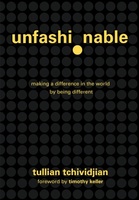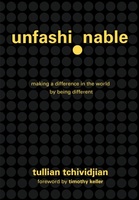Yesterday, Collin Hansen profiled Tullian Tchividjian, the 36-year-old Florida pastor whose church recently merged with Coral Ridge Presbyterian Church (formerly led by D. James Kennedy).

We weren’t the only ones talking about Tchividjian yesterday. Popular Reformed blogger Tim Challies reviewed Tchividjian’s new book, Unfashionable: Making a Difference in the World by Being Different, and found himself surprisingly in disagreement with large sections of it.
While Challies liked a lot of the book, he thinks Tchividjian has a “theology of God’s kingdom that I just was not able reconcile with Scripture ?. He writes about transformationalism, the view that God seeks to redeem and renew not just people but nations and cultures. My concern is that such theology emphasizes the continuity between the world today and the world after the consummation of history and does so at the expense of the kind of radical discontinuity Scripture teaches.”
Challies is quick to explain that he believes in a real resurrection of the earth and of bodies “that somehow, are still our bodies.” He writes, “I know that when history is consummated in Christ, we will not go to some kind of ethereal cloud-land heaven. ?. [T]here will be some genuine continuity between life now and life hereafter. As we read Scripture we wrestle with reconciling both continuity and discontinuity.”
But Challies doesn’t think that Scripture emphasizes, as Tchividjian says, that “Churches are designed by God to be instruments of renewal in the world, renewing not only individual lives but also cultural forms and structures, helping to make straight all that is crooked in our world.”
“I do not see Paul’s concern with culture except as a means to reach souls,” Challies writes.
Our mission involves both evangelism and cultural renewal, Tchividjian says in his book. “This is true because God exercises his domination both through saving grace (the means by which he converts people, raising them from spiritual death to spiritual life in Christ) and common grace (the goodness he shows to all people, Christians and non-Christians).”
The debate may be an early signal of a coming backlash against the eschatology that has become very common and much promoted in evangelical circles over the last decade or so, in part (though far from exclusively) led by theologian N.T. Wright’s work on the meaning of the Resurrection.
In a recent interview with theologian Ben Witherington, Wright addressed what he sees as a common misconception about his views on the continuity between Christians’ work in this world and the coming Kingdom of God:
We are not building the kingdom by our own efforts, no. The Kingdom remains God’s gift, new creation, sheer grace. But, as part of that grace already poured out in Jesus Christ and by the Spirit, we are building for the kingdom. I use the image of the eleventh-century stonemason, probably illiterate, working away on one or two blocks of stone according to the orders given to him. He isn’t building the Cathedral; he is building for the Cathedral. When the master mason/architect gathers up all the small pieces of stone at which people have been working away, he will put them into the great edifice which he’s had in mind all along and which he alone can build – but for which we can and must build in the present time. Note 1 Corinthians 3, the Temple-building picture, and the way it relates directly to 1 Cor 15.58: what you do in the Lord is not in vain, because of the resurrection.
I have absolutely no idea how it might be that a great symphony or painting, or the small act of love and gentleness shown to an elderly patient dying in hospital, or Wilberforce campaigning to end the slave trade, or the sudden generosity which makes a street beggar happy all day – how any or all of those find a place in God’s eventual kingdom. He’s the architect, not me. He has given us instructions on the little bits of stone we are meant to be carving. How he puts them together is his business.
A question for Christian leaders (whether in the church or elsewhere): have you found the recent Christian emphasis on “building for the kingdom” and cultural renewal to detract from evangelism? Or is it actually helping to “reach souls”? Do you resonate more with Challies’s view of Scripture or with Tchividjian’s?









